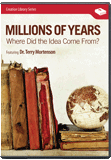Looking Into the Vatican's Views On Science
In an eye-opening article concerning the Vatican’s views on science, a Discover magazine reporter takes an insider’s look into the Pontifical Academy of Sciences. Sadly, the fruits of an old-age mentality are on display.
News Source
- Discover via MSNBC: “How to Teach Science to the Pope”
Reporter Michael Mason spent some time discussing the scientific policy and direction of the Roman Catholic Church with Brother Guy Consolmagno (a Vatican astronomer), other Catholic officials, and members of the Pontifical Academy of Sciences, a group that Mason describes as “a surprisingly nonreligious institution as well as one of the Vatican’s least understood.” Although the account begins with interesting research activities being undertaken, Consolmagno leaves little doubt as to what he considers the source of true authority.
“A hundred years ago we didn’t understand the Big Bang,” he says. “Now that we have the understanding of a universe that is big and expanding and changing, we can ask philosophical questions we would not have known to ask, like ‘What does it mean to have multiverses?’ These are wonderful questions. Science isn’t going to answer them, but science, by telling us what is there, causes us to ask these questions. It makes us go back to the seven days of creation—which is poetry, beautiful poetry, with a lesson underneath it—and say, ‘Oh, the seventh day is God resting as a way of reminding us that God doesn’t do everything.’ God built this universe but gave you and me the freedom to make choices within the universe.”
Consolmagno leaves little doubt as to what he considers the source of true authority.
Before moving on, it is important to stop and consider what the lesson “underneath” a poetic interpretation of Genesis would be. If Genesis is not the literal account of God’s creative actions, then does that mean that God is deceptive? After all, if we are to read Genesis as a poetic rendering of the big bang, then the order of creation would be completely wrong. For example, in the big bang model, stars existed before the earth, but God’s Word emphatically tells us that the earth existed first. That’s quite a big error. So, is God’s supposed message in a “poetical” rendering that He doesn’t know how He created?
Further down, the author claims that the reason for the Vatican’s “scientific caution and hesitancy” is because of the lessons learned from the trial and condemnation of Galileo in the 1600s.” There’s only one problem. Galileo, a Christian, was not the martyr of science he has been made out to be; instead, his arrogance and the envy of his colleagues (as well as politics) likely led to his trial. Unfortunately, the Galileo myth is so ingrained that historical facts are often overlooked. (By the way, and as is not commonly known, Galileo’s ideas were not in opposition to the Bible, as is sometimes believed, but to the Ptolemaic astronomical belief of an earth-centered universe; as such his main opposition came from the scientific establishment of his day and the Roman Catholic Church had made the error of adding Ptolemaic theories to its theology.)
Galileo, a Christian, was not the martyr of science he has been made out to be.
While we can certainly applaud the Academy for getting input and ideas from many different people, religious or not, the disturbing aspect is the weight given to human opinions over the teachings of the Bible, which the Church declares as the Word of God. Italian physicist Nicola Cabibb, who presides over the academy, for example, has claimed that the understanding of the origin of life does not require a belief in God—allowing only that science cannot answer questions about “why things exist and what their purpose is.” So, why would someone who doesn’t see a need for God in the origin of life be leading such a prestigious group in the Catholic Church? Sadly, the answer may be found in the comments of Father George Coyne, the retired head of the Vatican Observatory.
“There is no science in the Bible. Zero, none,” Coyne says. “The Bible was written in different times by different people. Some of the books are poetry, some of them are history, some are stories.”
“Are you saying that the Bible should not be held up to scientific scrutiny?” I ask.
“That is correct,” Coyne says. “Absolutely.”
Consider Coyne’s claim: there is no science in the Bible. To test this claim, first, let’s list some fields of science to consider—cultural anthropology, archaeology, psychology, astronomy, and biology. If Coyne is right, none of those fields should apply or even be represented in God’s Word. Cultural anthropology is the study of human social structure, language, law, politics, and much more. Does the Bible make statements about any of these? The books of Judges and Kings describe the social structure of the unified and divided kingdoms, how the kingship arose, and many statements about the politics of the day. These are testable observations, but, alas, they can’t be science, right? What about archaeology? The Bible is filled with observations about the location and origin of of many cities and people groups. But, again, these surely cannot be scientific statements. Psychology? The Bible offers a wealth of case studies about behavior and motivations. Too bad they cannot be counted in Coyne’s view.
What about astronomy and biology? Ah, now here’s where the real rub is. Archaeology and psychology are one thing, but origins are another. It is likely that what Coyne really means is that the Bible cannot be allowed to comment on these areas, since science has shown the “real answers” about the history of the universe. While we would agree that the Bible does not offer an exhaustive look at any one field of science, God has given us some testable, verifiable accounts of history, biology, and human nature. One can examine what it says about the ancient world and discover that these statements are accurate. If it is accurate in those areas, then why would we suddenly disconnect it from the real world when it, quite obviously, makes testable statements about geology (the Flood), the universe, and the origin of life?
The Bible is filled with observations about the location and origin of of many cities and people groups.
This disconnect is sadly symptomatic of the problems in much of Christianity. When the millions-of-years mentality creeps in and usurps the clear teaching of Scripture, Christians must either compartmentalize their faith as what is and is not the realm of science (i.e., naturalism masquerading as science) or reduce the Bible to the status of just another book with some truths. As Coyne says, the parts that don’t line up with current human opinion are conveniently tossed aside as “poetry” and “stories.” If that’s the case, then humans decide when God is and is not saying what He means based on perhaps the trendy ideas of the week. This can readily be seen in a later comment by Monsignor de Toca:
“When there are convincing reasons, we must interpret the Bible in a different way,” de Toca explains.
The author of the article rightly points out what this implies (and points out how compromise weakens a Christian’s witness):
When science posits a truth that seems to contradict Scripture (lack of evidence of a global flood, for example), the Bible’s inherent elasticity simply envelops the new finding, and any apparent contradiction is relegated to the realm of parable (where Noah’s ark resides, in the view of many Catholics).
If God did not mean what He said in the Bible ... then what good is the Bible to us?
If the Bible is not the starting point, as it is not for many in this article, then anything can be tossed out when there are “convincing reasons.” However, this argument is flawed in many ways. First, naturalists would say that there are “convincing reasons” to assume that Christ could not have physically risen from the dead, since that is not possible in a naturalistic framework. But if that’s the case, if He did not physically rise from the dead, then we are all dead in our sins, and those quoted in this article have a worthless faith that cannot save them (1 Corinthians 15:12–19) . Second, what if the “reasons” for rejecting what the Bible teaches turn out to be wrong? For example, there are many geologists who do unequivocally see evidence of a global Flood in the millions of dead things in rock layers all over the world. They, too, are scientists, but they are ignored simply because they do not toe the Darwin party line. Finally, if God did not mean what He said in the Bible, if He spoke in such a way that the “interpretation” can change with the winds of current thought, then what good is the Bible to us? There may be “moral lessons” hidden in the parts that conflict with what “science” tells us, but who decides what those moral lessons are? Do they simply shift along with what humans assume is best? Is God really God if He can’t speak clearly enough that we can understand Him or if He doesn’t provide concrete, unchanging truth?
The sad reality is that the more Christians give ground to the supposed “revelations” of Darwinists and old-earth scientists, the more the Bible, which claims to be God’s Word to us, is tossed aside. That in itself should give these men pause. If they really do trust in God as they claim, then why do they not trust Him to tell us the truth?
Further Reading
- A Battle for Men’s Souls: Part 1, Part 2
- Six Days of Creation—A Superstition?
- Does the Big Bang Fit with the Bible?
- Jesus, Evangelical Scholars, and the Age of the Earth
- Eisegesis: A Genesis Virus
For More Information: Get Answers
Remember, if you see a news story that might merit some attention, let us know about it! (Note: if the story originates from the Associated Press, FOX News, MSNBC, the New York Times, or another major national media outlet, we will most likely have already heard about it.) And thanks to all of our readers who have submitted great news tips to us. If you didn’t catch all the latest News to Know, why not take a look to see what you’ve missed?
(Please note that links will take you directly to the source. Answers in Genesis is not responsible for content on the websites to which we refer. For more information, please see our Privacy Policy.)
Recommended Resources

Answers in Genesis is an apologetics ministry, dedicated to helping Christians defend their faith and proclaim the good news of Jesus Christ.
- Customer Service 800.778.3390
- © 2024 Answers in Genesis








